
-
Find the right food for your petTake this quiz to see which food may be the best for your furry friend.Find the right food for your petTake this quiz to see which food may be the best for your furry friend.Featured products
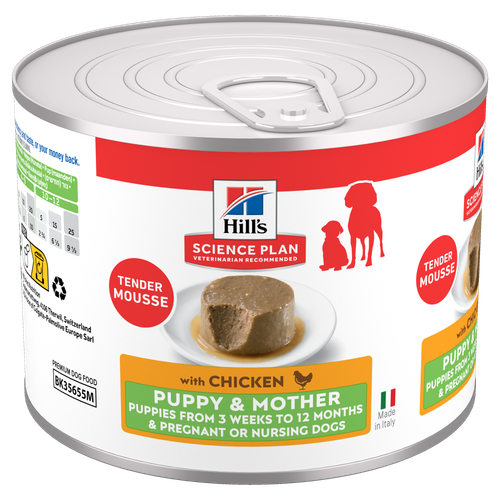 Puppy & Mother Tender Mousse Dog Food
Puppy & Mother Tender Mousse Dog FoodHill's Science Plan Puppy & Mother Tender Mousse Dog Food with Chicken is a complete premium pet food for puppies and pregnant or nursing dogs. Formulated with chicken and other specially selected ingredients, including minerals and antioxidants to support gut health and optimal growth, it comes in a soft mousse texture they'll love.
Shop Now Perfect Weight Small & Mini Adult Dog Food
Perfect Weight Small & Mini Adult Dog FoodHill's Science Plan Adult Small & Mini Dog Food with Turkey is a complete premium pet food for adult small dogs from 1 year old that are prone to weight gain or slightly overweight. This deliciously smooth mousse is formulated to deliver the appropriate amount of energy to support weight maintenance in adult dogs.
Shop Now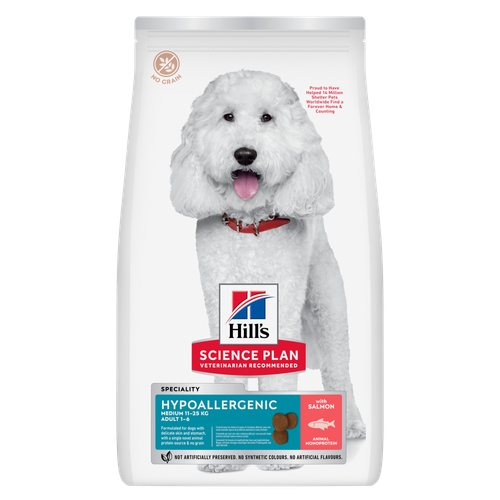 Hypoallergenic Medium Adult Dog Food
Hypoallergenic Medium Adult Dog FoodScience Plan Hypoallergenic Medium Adult dog food with Salmon is a gentle, science-led formula crafted for dogs with food sensitivities. Made with carefully selected, high-quality novel proteins and no grains, it’s tailored to minimise common triggers that can lead to skin and digestive discomfort.
Shop NowFeatured products Oral Care Adult Cat Food
Oral Care Adult Cat FoodHill's Science Plan Oral Care Adult Cat Food with Chicken contains clinically proven kibble technology to reduce plaque & tartar build up.
Shop Now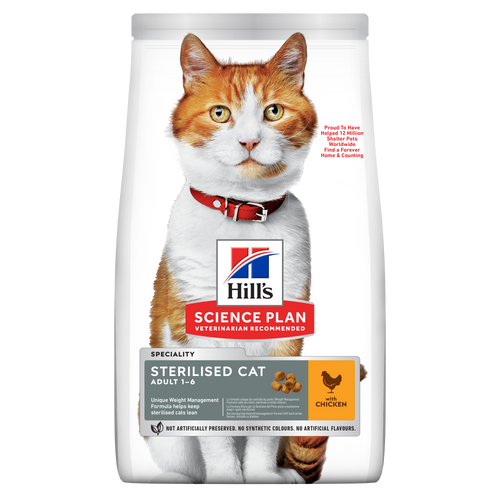 Sterilised Adult Cat Food
Sterilised Adult Cat FoodHill's Science Plan Adult Sterilised Cat Dry Food with Chicken is specially formulated with ActivBiome+ Multi-Benefit Technology. It is a precisely balanced nutrition, tailored to meet the needs of sterilised cats, to help keep sthem lean & healthy.
Shop Now Hypoallergenic Dry Cat Food
Hypoallergenic Dry Cat FoodHILL'S SCIENCE PLAN Hypoallergenic Adult cat food with egg & insect protein is a complete pet food for adult cat 1–6 years old. It's formulated for cats with delicate skin and stomach, with limited high quality novel protein sources & no grain.
Shop Now -
Dog
- Dog Tips & Articles
-
Health Category
- Weight
- Food & Environmental Sensitivities
- Urinary
- Digestive
- Joint
- Kidney
-
Life Stage
- Puppy Nutrition
- Adult Nutrition
- Senior Nutrition
Cat- Cat Tips & Articles
-
Health Category
- Weight
- Skin & Food Sensitivities
- Urinary
- Digestive
- Kidney
-
Life Stage
- Kitten Nutrition
- Adult Nutrition
Featured articles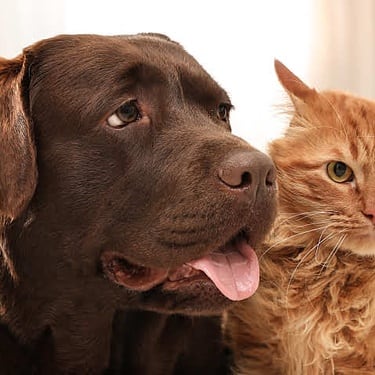 What Cleaning Products Are Safe for Pets?
What Cleaning Products Are Safe for Pets?Learn which cleaning product ingredients can be hazardous for dogs & cats, which alternatives are safer and tips for using cleaning products around pets.
Read MoreTips for Working From Home With a PetGet helpful information on how to get all of your work done while keeping your dog or cat entertained when working from home.
Read More Tips For Mixing Wet And Dry Pet Food
Tips For Mixing Wet And Dry Pet FoodDiscover tips for mixing wet and dry pet food to ensure balanced nutrition and variety for your pet. For comprehensive feeding advice, visit Hill's Pet UK.
Read More -


You caught your dog doing the booty scoot on your favourite rug and now you're wondering why they do it and how you can get it to stop. Whether that or excessive licking of your pet's hind region is what brought you here, it's likely that your dog's anal glands need attention. While that's probably the last part of your dog's anatomy you'd like to pay attention to, the fact is that anal gland problems in dogs are fairly common and often the cause of dog scooting problems.
Your Dog's Anal Glands
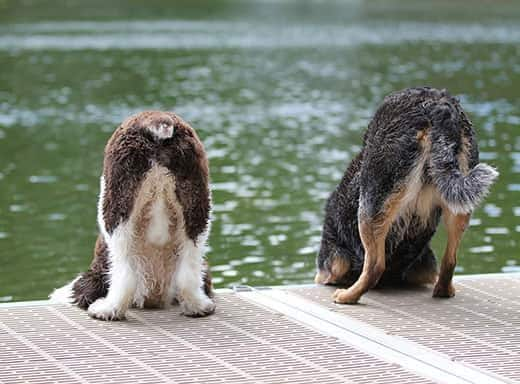
Your dog's hind end includes two small sacs located on the inside of their rectum, one on each side within the muscular wall, says The Spruce. These sacs gradually fill with secretions from sebaceous glands — the same glands found at the end of hair follicles that are responsible for unwashed hair becoming greasy — located inside each sac.
The only real function these anal glands are known to serve is in doggy communication: they're what dogs sniff when they say hello to each other. They also excrete scent whenever your dog goes number two, and may make it easier for your pet to pass stools. When they're working properly, these glands are emptied when your dog does their business.
Anal Gland Problems in Dogs
Unfortunately, things don't always function properly. Soft or small stools don't provide enough pressure to empty the sacs. If the glands fill until they become uncomfortable, your beloved pup scoots across the floor to get relief. When this happens, the glands are what's called impacted, says Preventive Vet.
Not only are impacted anal sacs uncomfortable for your pooch, but if ignored they might become infected and abscessed, requiring treatment with antibiotics. If the abscessed glands rupture, they may need surgery to repair, and your dog might also need pain medication to aid their recovery.
Anal Gland Expression
When anal gland problems in dogs begin to develop, human intervention may be required to provide relief. Impacted anal glands need to be manually expressed, a task that can be performed by a veterinarian, or a vet nurse — some dog groomers who have been trained in the task may do this as part of the routine grooming, but if you notice an issue, you should always bring your dog to the vet over the groomer.
Manually expressing a dog's anal glands typically involves inserting a gloved finger into the rectum to locate the gland and gently squeeze it to empty its contents. If impacted anal glands become a recurrent problem, manual expression might need to be done on a regular basis. You could do this for your dog at home, but it's best to have a professional teach you how before attempting it on your own. A startled or uncomfortable dog could snap or bolt. The ‘ick factor’ involved in the task might also convince you it's a job best left to the pros.


Tasty Tips
What Causes Anal Gland Problems in Dogs?

Poor quality bowel movements can contribute to anal glands becoming impacted, says Petfinder. Constipation and diarrhoea can produce a stool that isn't sufficient for the task of emptying the anal sacs. Hereditary malformations of the anal glands could also be a cause. Preventive Vet adds that chronic skin conditions, including yeast infections, skin or food allergies or infestations of skin mites, may increase a dog's chances of developing chronic anal gland problems.
Other contributing factors include low thyroid function and obesity. And although it's less common, a tumour could be to blame. It's also possible that unnecessary anal gland expression, as is sometimes done routinely by groomers, could create scar tissue that prevents the glands from being able to empty themselves. If this might apply to your dog, talk to your groomer to make sure your pup's glands aren't being unnecessarily expressed on every visit, which could do more harm than good.
Signs of Impacted or Infected Anal Glands
While dog scooting could be one possible symptom of anal gland problems, this behaviour could have other causes, such as parasites or digestive problems. Or, it could simply be an itchy butt. Typically, a dog with impacted anal glands will scoot more than once or twice, and can also usually be seen licking their rear end. Redness or swelling around the sphincter is an indication that the glands are becoming infected, as is blood or puss in your dog's stool or left behind on the carpet after they've finished scooting.
When to See a Vet
If you suspect your dog may have impacted anal glands, talk to your vet to see if your dog should be brought in. However, if you notice redness or swelling, or if the skin around your dog's bottom starts to look like a pimple that's coming to a head, the gland is likely infected or abscessed and should be seen by a vet as quickly as possible. A ruptured abscess is an emergency and needs to be treated right away to minimise the damage to your dog and lessen their pain.
You should also see your vet if impacted anal glands are a recurring problem for your dog, in order to determine whether there's an underlying condition that needs to be treated, like a tumour or a thyroid disorder.
Helping Your Dog
Here are some steps you can take to prevent or reduce the recurrence of impacted anal glands in your pup:
- Make sure your dog is getting enough fibre in their diet so that they're producing healthy stool. Talk to your vet about putting your dog on a diet that is formulated for healthy digestion and proper stool formation.
- If your dog is overweight, ask your vet about taking steps to help them reach and maintain a healthy weight.
- Work with your vet to identify and treat or manage any potential underlying causes.
- If your vet approves, supplement your dog's diet with fish oil, which Preventive Vet notes has anti-inflammatory properties that may help reduce the irritation around impacted glands, or they may recommend a food enriched with fish oil.
- Again, check with your groomer to make sure your pup's anal glands aren't being expressed unnecessarily.
While it's not a pleasant thing to think about, anal gland problems are common enough that it pays to be vigilant in watching out for them. So the next time you see your dog scooting or licking their rear end, be sure to pay close attention to what's going on back there. Your dog may not be able to thank you with words, but they're nevertheless sure to appreciate the relief you can provide.


Chrissie Klinger is an educator, writer and mother of two children, three dogs and three cats. Her dog Jake loves sitting on her lap every chance he gets! She enjoys living an active and eco-friendly lifestyle in rural Pennsylvania.
Related products

Hill's Science Plan Puppy & Mother Tender Mousse Dog Food with Chicken is a complete premium pet food for puppies and pregnant or nursing dogs. Formulated with chicken and other specially selected ingredients, including minerals and antioxidants to support gut health and optimal growth, it comes in a soft mousse texture they'll love.

Hill's Science Plan Adult Small & Mini Dog Food with Turkey is a complete premium pet food for adult small dogs from 1 year old that are prone to weight gain or slightly overweight. This deliciously smooth mousse is formulated to deliver the appropriate amount of energy to support weight maintenance in adult dogs.

Science Plan Hypoallergenic Medium Adult dog food with Salmon is a gentle, science-led formula crafted for dogs with food sensitivities. Made with carefully selected, high-quality novel proteins and no grains, it’s tailored to minimise common triggers that can lead to skin and digestive discomfort.
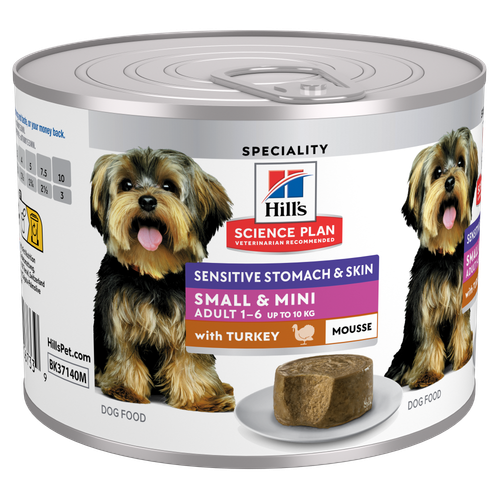
Hill's Science Plan Sensitive Stomach and Skin Small & Mini Adult Dog Food with Turkey is a complete premium pet food for small breed adult dogs aged 1–6 years. This deliciously soft mousse is enriched with ingredients that support digestive health & skin care.
Related articles
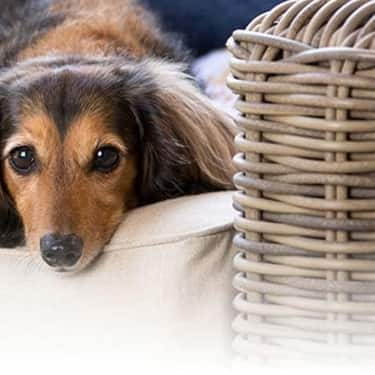
Puppy, kitten and pet dieting, cat nutrition and dog nutrition information from Hill's Pet
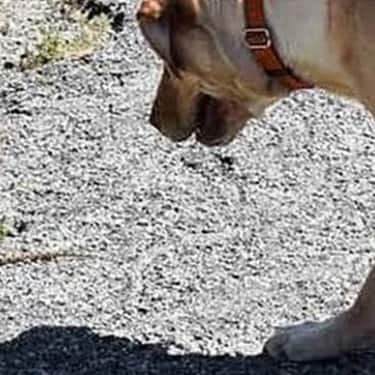
Learn about snake bites on dogs, including clinical symptoms to look for, what to do if you think your dog was bitten, and treatment & prevention options.
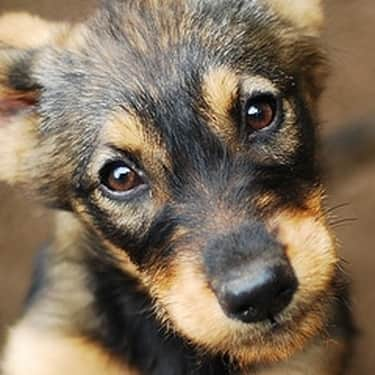
Discover the causes, signs, and treatments of kidney disease in dogs and find methods of supporting your dog's kidney health. Learn more at Hill's Pet South Africa.

Dog obesity is a significant problem - learn more about helping your dog become trimmer and healthier through improved nutrition.

Put your dog on a diet without them knowing
Our low calorie formula helps you control your dog's weight. It's packed with high-quality protein for building lean muscles, and made with purposeful ingredients for a flavorful, nutritious meal. Clinically proven antioxidants, Vitamin C+E, help promote a healthy immune system.
Put your dog on a diet without them knowing
Our low calorie formula helps you control your dog's weight. It's packed with high-quality protein for building lean muscles, and made with purposeful ingredients for a flavorful, nutritious meal. Clinically proven antioxidants, Vitamin C+E, help promote a healthy immune system.

